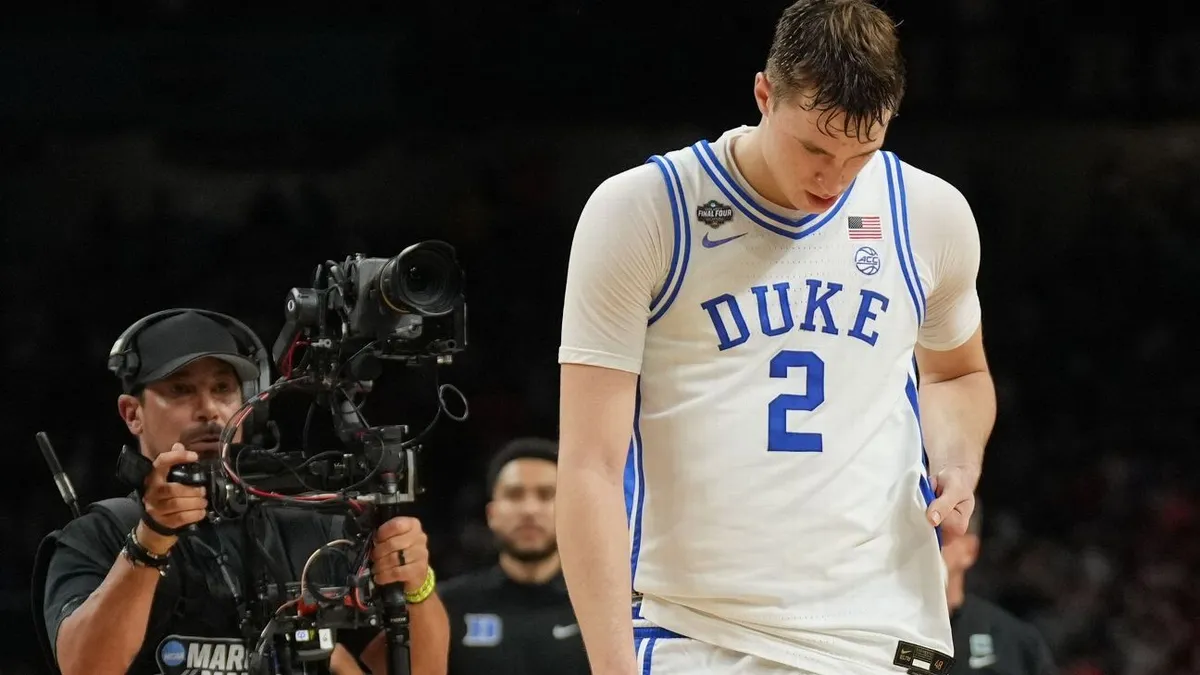
In a tense atmosphere enveloping the Duke locker room, the heavy silence was occasionally disrupted by the loud bang of a door slamming shut as players and staff entered the adjacent coaches' locker room. Each time, the sound echoed like a siren through the stillness, a stark reminder of the heartbreak that had just unfolded. After squandering a significant six-point lead in the final 35 seconds, Duke suffered a shocking defeat to Houston, losing 70-67 in the Final Four on Saturday night. The players were left to grapple with the emotional fallout in a room that felt like a graveyard.
As the gravity of the situation sank in, Duke players wandered quietly, grabbing slices of pizza from one of ten boxes stacked near a cooler filled with Powerade. Many stared at their phones, avoiding eye contact with the lingering media. One walk-on emerged from the shower with tears glistening in his eyes, while another penned his thoughts in a journal with a pencil. The stark reality of how a six-point lead could evaporate in less than 20 seconds weighed heavily on their minds.
Two pivotal moments in the final 20 seconds, both involving star freshman Cooper Flagg, marked the dramatic collapse. Flagg's missed 12-foot jumper, which came when Duke trailed by just one point, will forever be etched in the memories of fans. With only 17 seconds on the clock, Duke called a timeout to set up a crucial play. The strategy was clear: isolate Flagg against Houston's sixth-year senior, J'Wan Roberts. However, Flagg's shot, which he believed he executed perfectly, hit the front rim and fell short. “It’s the play the coach drew up,” Flagg reflected. “I thought I got my feet set, rose up... I left it short, obviously. A shot I’m willing to live with in that scenario.”
Despite the disappointment, Duke senior Sion James defended Flagg's performance, stating, “Sometimes shots go down, sometimes they don't. That one didn't.” However, the situation became even more precarious when Flagg committed an over-the-back foul on Roberts after Tyrese Proctor missed the front end of a one-and-one with just 20 seconds remaining. Duke held a slim 67-66 lead at the time, but Flagg's foul allowed Roberts, a 63% free throw shooter, to make both shots, flipping the score to 68-67 in favor of Houston.
For a program renowned for its grit and toughness, Houston's advancement to the national title game was characterized by a decisive box-out that changed the game. Kellen Sampson, an assistant coach at Houston, shared a wise old basketball adage from his father: "Discipline gets you beat more than great helps you win." He emphasized that maintaining discipline allows players to execute the small, critical details that lead to victory. “A big-time free throw blockout was exactly what was needed,” he stated.
The controversy surrounding Flagg's foul will undoubtedly be a topic of debate among fans and analysts alike, but it undeniably placed Duke in a precarious position. In the blink of an eye, they transitioned from a six-point lead to trailing by one point within a 15-second span. Houston's tactical adjustment to allow Roberts to defend Flagg one-on-one proved to be a game-changer. “We trust J'Wan to handle the matchup himself,” Sampson explained. “You have the No. 1 defense in America for a reason. Trust him.”
Throughout the game, Houston’s defense showcased its formidable nature, exemplified by Duke center Khaman Maluach's troubling stat line—failing to secure a rebound in over 21 minutes of play and finishing with a dismal plus-minus of -20. Roberts' defensive prowess culminated in a critical contest against Flagg's potential game-winner. “I thought he did an awesome job of getting his hands up high enough that it wasn't an easy look,” Sampson noted, highlighting the challenges Flagg faced.
Ultimately, Flagg finished the night with 27 points, shooting 8-for-19 from the field, but he received little support as Duke managed just one field goal over the last 10:30 of the game. As he rode back to the locker room in a golf cart at 11:54 p.m., Flagg stared blankly ahead, a towel draped around his neck, confronting the reality of a season that had ended abruptly. Moments later, Duke coach Jon Scheyer passed by with his wife and athletic director Nina King, grappling with the aftermath of a significant collapse.
Duke’s inability to close out the game now stands as a stark reminder of the fragility of victory in high-stakes basketball. Having coughed up the fifth-biggest lead in Final Four history, the loss will resonate within the program long into the offseason. “I keep going back; we’re up six with under a minute to go,” Scheyer lamented. “We just have to finish the deal.” The echoes of disappointment will linger, much like the slamming door that marked the end of their Final Four journey.